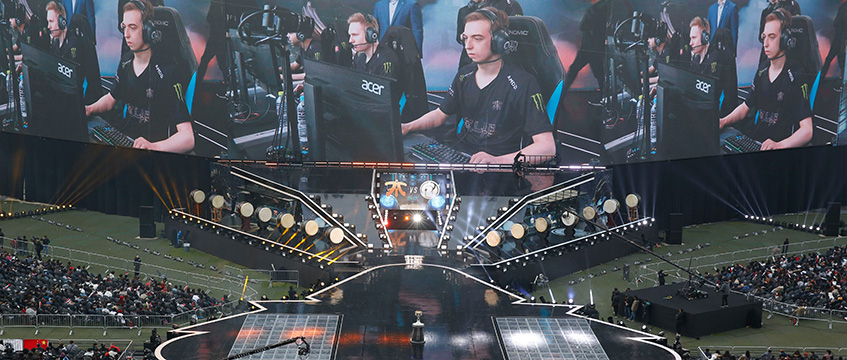Last May, more than 5.4m people tuned in to a competitive video gaming broadcast. That is about the same number of viewers who watched the men’s 100m final at the Tokyo Olympics on the BBC. The event was Singapore’s annual Free Fire World Series – and its viewership was the highest of any gaming competition on record.
That number could well be surpassed this year. E-sports is now a billion-dollar industry, with revenue having more than doubled since 2016. And with dramatic growth has come a raft of new real estate needs.
Last week, London’s e-sports scene made one of its biggest-name lettings yet, with a team sponsored by David Beckham signing a lease for a 9,800 sq ft headquarters in Shoreditch. The new home for Guild Esports will include conventional offices, but also training rooms, dedicated gaming space and a fitness studio for the players.
The level of bespoke fit-out demanded by teams such as Guild Esports is indicative of how serious e-sports occupiers have become, says Gavin Poole, chief executive of east London tech campus Here East. The Delancey-owned, 1.2m sq ft campus at the 2012 Olympic Park is one of the biggest e-sports hubs in the country, and hosts training facilities for another UK team, London Esports.
“It’s like a pyramid,” says Poole. “As with any traditional sportsperson, you’ve got a whole host of different support services behind them.” This includes coaches and physios as well as nutritionists and even behavioural scientists – and all of them need space to work. “These are professional game players,” Poole adds. “And some of them are making a very profitable living.”

Indeed, in 2019, British e-sports player Jaden Ashman, then aged just 15, became the youngest e-sports millionaire, earning $1m (£746,000) when he came second in the Fortnite world championship. Most Premier League football teams have their own e-sports arms (predictably, Manchester City leads the way) and Guild Esports even listed on the London Stock Exchange in 2020.
Despite this, Britain’s e-sports market share is less than 8% of global revenue, according to the Association for UK Interactive Entertainment. Richard Howard, international partner at Cushman & Wakefield, says: “The UK has a small fraction of global e-sports business compared with what is going on abroad. It’s definitely going to be a really big growth thing here too.”
All of this encourages activity from other types of tenant in the e-sports supply chain. Broadcasting giant BT Sport has sponsored UK team Excel Esports since early 2020, and regularly shows its competitions at video game League of Legends. And learning institutions also feature heavily. The digital-focused Staffordshire University London teaches an e-sports course and has its own studio space devoted to competitive gaming. Both BT and the university are based at Here East, with the latter having doubled its space to 35,000 sq ft last year to meet demand.
Unique opportunity
“From a real estate perspective, it offers quite a unique opportunity,” Poole says. “A by-product of the pandemic is that we’ve seen demand and appetite for content consumption go through the roof, so it is no surprise that you end up with people wanting to develop broadcast capability, content creation studios, space where we can bring participants together not just remotely, but in real life.”
Because of the ecosystem forming around e-sports, Poole is adamant that campus developments such as Here East are the ideal setting for occupiers. Other UK hubs include Warwick University, which last year invested £275,000 in its e-sports facilities, while Northampton College opened an arena in November as part of its £6.3m digital academy. Earlier this month, the British Esports Association announced it would open an e-sports performance and education campus at Riverside Sunderland.
“We’ve seen this economy forming around competitive gaming and game distribution in our area,” Poole says. “E-sports occupiers want to be around like-minded businesses, whether it’s marketing, related brands, music, fashion, broadcasting. And that is why Guild has gone to [Shoreditch], where there are a whole bunch of creatives – not specifically around gaming, but there are so many other crossover points.”
How big could that economy get? Forecasts see global e-sports industry revenue increasing by one-third over the next two years to £1.6bn, according to Statista, with the bulk coming from sponsorship and advertising. By 2024, there are expected to be more than 577m viewers of e-sports worldwide.
“If someone said to me 10 years ago that we’d be talking about e-sports and TV as much as we are now, I would have said I can’t see any of that,” adds Cushman & Wakefield’s Howard. “And yet that is exactly where the buzz is right now.”
To send feedback, e-mail alex.daniel@eg.co.uk or tweet @alexmdaniel or @EGPropertyNews











